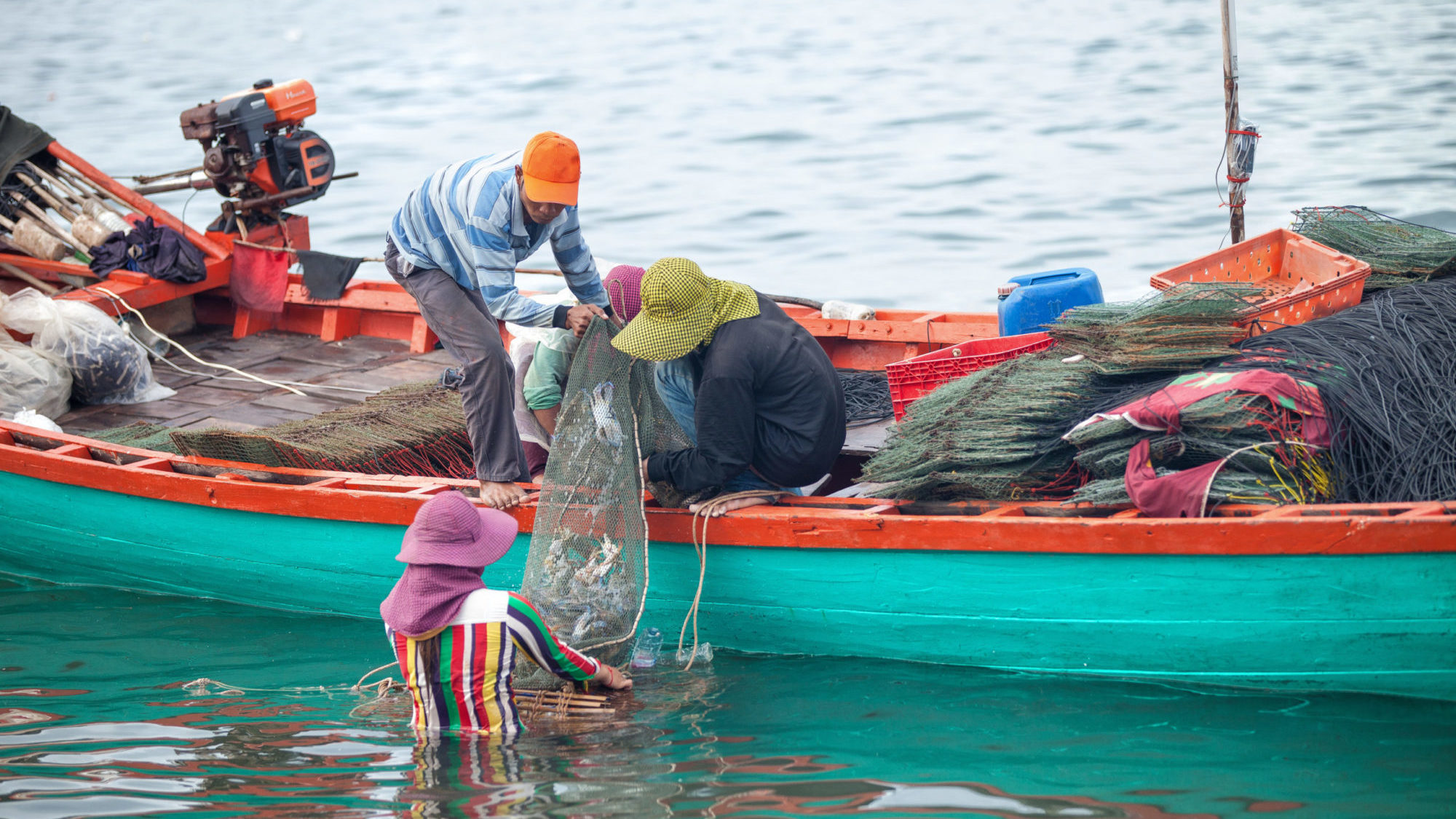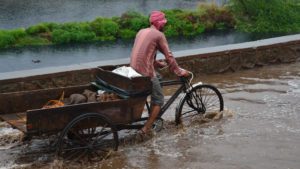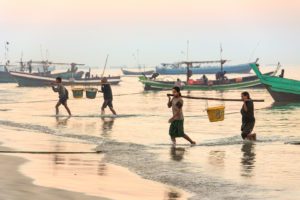Over the past month, more than 60 world leaders have announced bold commitments to reduce deforestation, end unsustainable fishing practices, and halt other environmental destruction around the globe. As these countries put together plans to make good on the Leaders’ Pledge for Nature, they must take a hard look at the broken systems that allow those who have the least to suffer the most.

Small scale fishers in Cambodia. Source: lena_serditova/Adobe Stock
A smart bet for tackling a systematic problem that is harming the ocean and the nearly 40 percent of the world’s population who depend on marine and coastal resources for their jobs, is addressing the billions of public dollars that are being poured into unsustainable and irresponsible fishing subsidies each year. In theory, this money is intended to provide economic support to communities that depend on fishing for income and food while creating stability in the seafood supply chain. In reality, nothing could be further from the truth. These subsidies hurt fish populations and the people they are supposed to be helping.
Each year, governments spend an estimated USD 35 billion on fisheries subsidies—but more than USD 22 billion of that money goes toward subsidies that make fuel cheaper and increase overall fishing capacity. These subsidies encourage fishing beyond profitable and sustainable levels and are a key contributor to the decline in fish populations worldwide. According to the Food and Agriculture Organization of the United Nations, 34 percent of fish stocks are overfished and nearly 60 percent of fish stocks are being fished to their maximum sustainable limits.
In addition to contributing to overfishing, these subsidies are linked to illegal, unregulated, and unreported (IUU) fishing, which enables a host of labor abuses, including modern slavery, human trafficking, and other human rights abuses. Research shows that fleets that are heavily subsidized tend to fish far away from home ports, fail to report their actual catch, and are much more likely to commit labor abuses.
Subsidies can also have a disproportionately negative impact on coastal communities, especially those that rely on small-scale, wild-capture fisheries for employment, food, and livelihoods for tens of millions of people throughout the world. Recent estimates suggest that small-scale fisheries account for over 90 percent of the 100 million commercial fishers, processors, and others employed along the fisheries value chain. Roughly half are employed in marine fisheries—the other half in inland fisheries—making small-scale fisheries far and away the ocean’s largest employer. Most of these small-scale fishing jobs are concentrated in developing economies, providing a critical source of employment and subsistence in economies with relatively limited opportunities. Yet an estimated 80 percent of fisheries subsidies are allocated in support of the large-scale industrial fleets and companies, not for local communities for whom fish are their primary nutritional source and livelihood. Since women are proportionally more small-scale than large-scale fishers, this also aggravates the widely pervasive gender inequality plaguing the world.
According to OECD estimates, if the money currently spent on fuel subsidies, widely considered the most harmful subsidy, was shifted to one of the best performing ones—such as those that offer working capital to small fishing businesses or help build their business acumen—fish stocks would grow and fishers could catch more fish, earning about USD 2 billion more each year. Diverting money away from harmful subsidies and toward fishers’ incomes that are decoupled from fishing, potentially through disaster payments or employment insurance, would also deliver benefits equitably across the fishing sector.
The good news is that there is already buy-in among the highest levels of government for shifting these investments to support the conservation and restoration of the marine environment and the sustainability of the marine economic sectors. The United Nations Sustainable Development Goals (SDGs) reinforce the WTO’s 2001 mandate to reach an agreement by the end of 2020 to eliminate harmful subsidies.
The good news is that there is already buy-in among the highest levels of government for shifting these investments to support the conservation and restoration of the marine environment and the sustainability of the marine economic sectors.
Momentum toward an agreement slowed when the pandemic sidelined a June 2020 WTO meeting, but as the WTO resumed conversations in September, it signaled an interest in meeting its December 2020 deadline. And the players seem to be aligning in this direction. China—which has previously resisted pressure to accept restrictions and curb the size and range of its vast fleet—recently announced that it was ready to fully engage in the negotiations. China, the European Union, the United States, South Korea, and Japan provide the majority of harmful subsidies.
The WTO continued these conversations in October and is expected to pick the topic back up when it meets again in November. This is a game-changing opportunity to fix a systemic problem that is harming people as well as the fish they depend on for food and livelihoods, but it requires action by the WTO before the end of this year. Governments committed to addressing harmful subsidies when they approved SDG 14. Now is the time for them to make good on that commitment.
Meg Caldwell leads the Ocean team at the David and Lucile Packard Foundation. Prior to joining the Foundation, she directed the Environment and Natural Resources Law and Policy Program at Stanford University. While at Stanford, she also served as Executive Director of the Center for Ocean Solutions (COS).
Dr. Rashid Sumaila is Professor and Director of the Fisheries Economics Research Unit at the University of British Columbia’s Institute for the Oceans and Fisheries. He specializes in bioeconomics, marine ecosystem valuation, and the analysis of global issues such as fisheries subsidies, IUU (illegal, unreported and unregulated) fishing, and the economics of high and deep seas fisheries.



